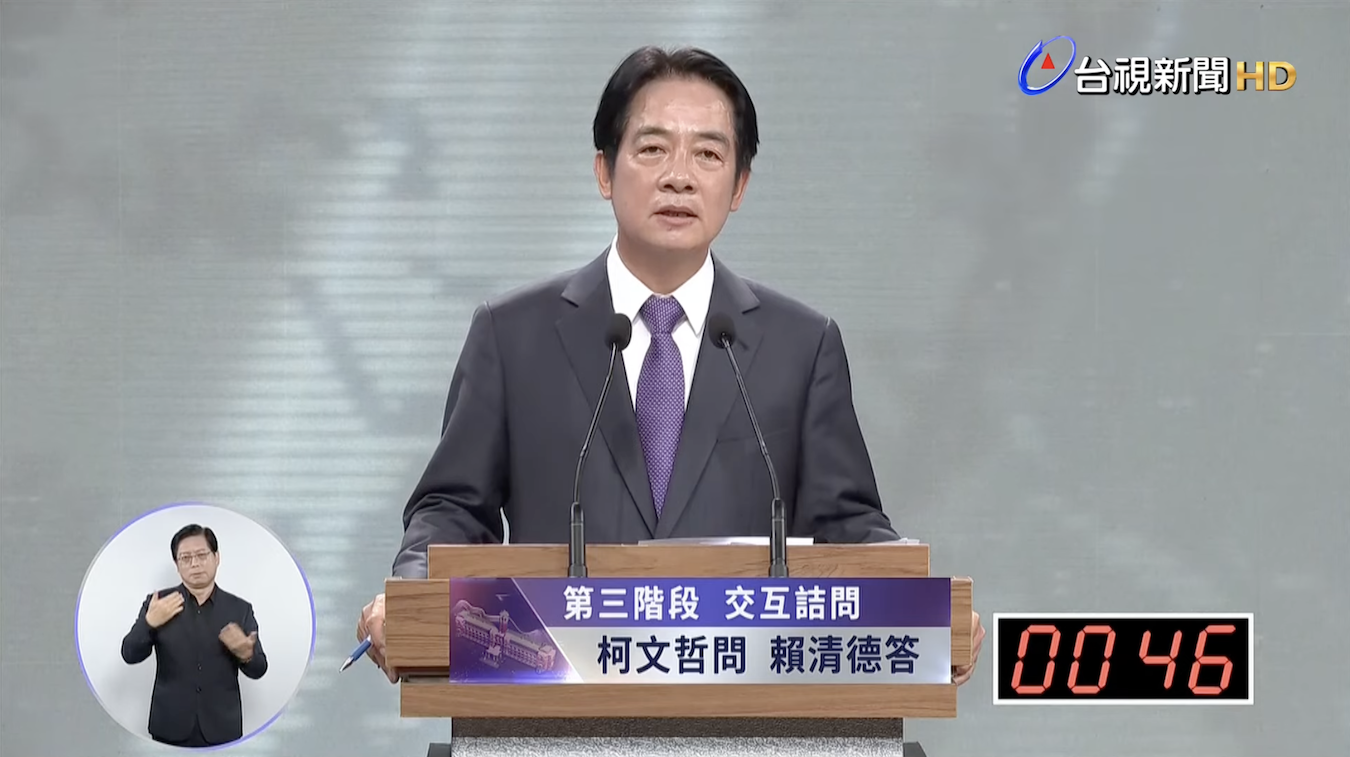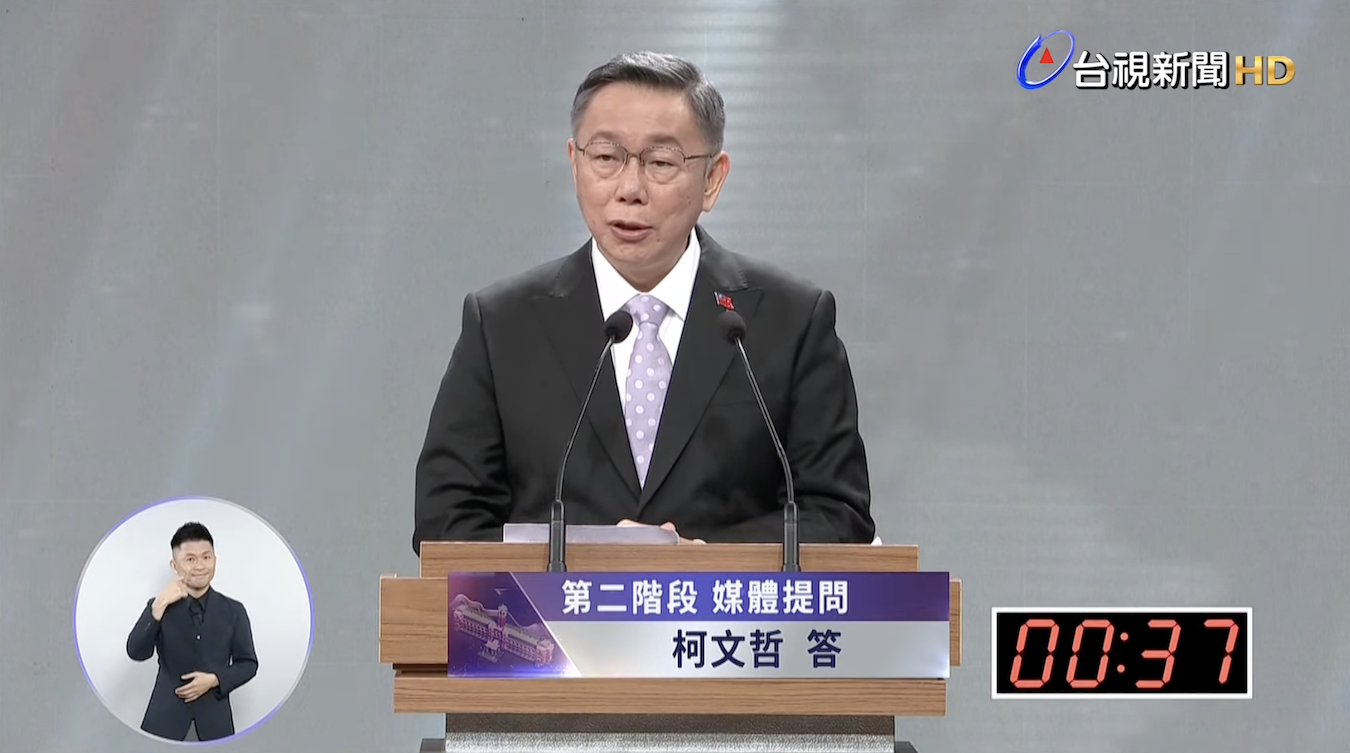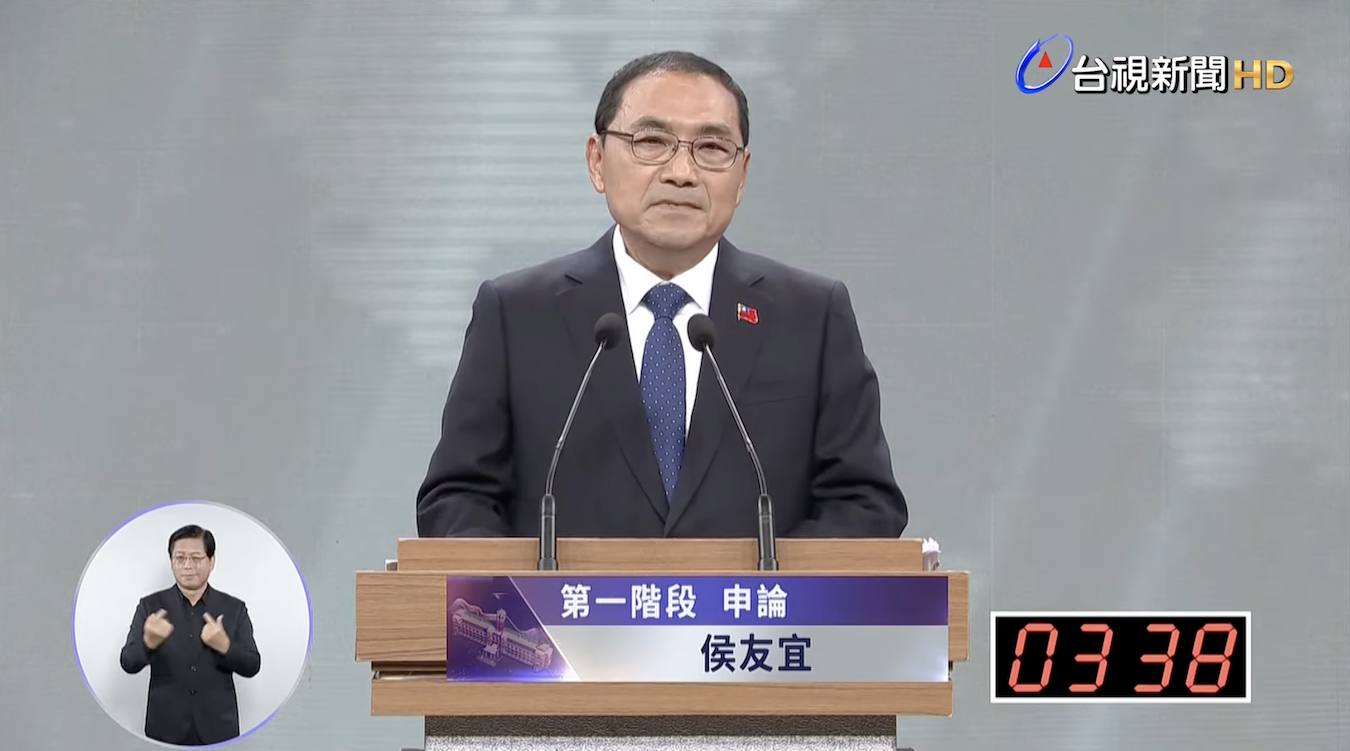by Brian Hioe
語言:
English
Photo Credit: TTV/Screenshot
THE ONLY PRESIDENTIAL debate of the election season took place today. This took place after three presidential policy presentations, which are not formal debates, but often amount to de facto debates. These took place on December 20th, December 26th, and December 28th.
There were four rounds to the debate. The first round consisted of opening statements by the candidates and the second round involved the candidates responding to questions from a panel of five media experts. The third round involved the candidates cross-examining each other, while the last round consisted of closing statements.
The order for the first round, which was decided by drawing lots, was first Lai Ching-te of the DPP, followed by Hou You-yi of the KMT, and Ko Wen-je of the TPP.
 Lai Ching-te. Photo credit: TTV/Screenshot
Lai Ching-te. Photo credit: TTV/Screenshot
Lai began by attacking Hou You-yi for continuing policy from an outdated past era, such as pushing for the CSSTA, the 1992 Consensus, and reliance on nuclear energy. Otherwise, Lai stated that much of Hou’s policies came from the Tsai administration. Lai touted the program of reform carried out by Tsai Ing-wen, which led to international attention on Taiwan, as well as accomplishments helping social demographics such as women, young people, and the elderly. Lai stated that the international world was focused on the elections, but that this reform would halt if the KMT was elected, including suggesting the KMT would act to block arms purchases from the US if it took power, citing 69 times that the KMT tried to prevent this from taking place. Lai suggested to this extent that the TPP was a party led by the unclear governance of one individual.
Hou spoke next, Hou criticized the DPP for poor governance, holding up a sign listing ten areas that the DPP had failed in. This included failing to tackle fraud or fix low wages, and suggesting illicit links to green energy companies. Hou criticized shortages that took place under the Tsai administration, suggested that there had been unclear policy on masks and vaccines, and criticized Lai over his family home. He stated that to look into corruption, he would revive the special investigations group. On cross-strait issues, he emphasized opposition to One Country, Two Systems and Taiwanese independence alike.
Ko was last in the opening round. Ko criticized the framing of him as a fellow traveler of China and the TPP as just ruled by him. Ko stated that politics required not just pushing for the interests of a specific political party and that both the DPP and KMT have disappointed Taiwan. Ko, too, attacked shortages of water, electricity, eggs, toilet paper, and other products, stating that the Tsai administration may have criticized the Ma administration’s failings when it came to the expectations of Taiwanese young people but had not been able to do any better. Ko criticized the DPP for attempting to transition away from nuclear energy, as well as overreliance on the semiconductor industry, and promised to allow young people to pursue their dreams. Ko criticized the Tsai administration for stirring up hate and asserted that he hoped for free and open exchanges with China.
The next round consisted of questions from media experts. Questions touched on issues ranging from the US-Taiwan relationship, that Taiwan has weak punishments for spying that are less than for drunk driving, whether candidates adhered to the ROC constitution, Taiwan’s future economic development, and proposals by the pan-Blue camp for Taiwan to shift to a cabinet-style system. Still, the candidates mostly spoke about cross-strait issues in this round.
Predictably, Lai leaned into defending the accomplishments of the Tsai administration in strengthening ties with western countries, emphasizing continuity with the Tsai administration, while Hou criticized the Tsai administration for its loss of diplomatic allies, and Ko attempted to frame himself as a moderate somewhere in between the other two. When asked if he supports unification, Hou sought to avoid the question and again emphasized opposing One Country, Two Systems as well as Taiwanese independence.
Ko downplayed past statements as that there is “One family on both sides of the Taiwan Strait,” claiming he said this just to be friendly to China, and that he was willing to talk to China if there was respect for Taiwan maintaining its democracy and way of life, claiming that he never accepted the 1992 Consensus either. Lai got around questions about the ROC constitution by emphasizing the changes to the constitution that emphasized Taiwan under Lee Teng-hui and that the constitution serves to protect democratic rights. Lai and Ko both agreed that there should be steps taken against spying, with Ko stating that penalties to be brought in line with international standards and Lai stating that new laws should deal with intermediate levels of co-optation, while Hou stated that he opposed any external force trying to influence Taiwanese elections.
 Ko Wen-je. Photo credit: TTV/Screenshot
Ko Wen-je. Photo credit: TTV/Screenshot
The third round allowed for the candidates to interrogate each other. Nevertheless, many of the same concerns raised during the media questioning were brought up again.
Both pan-Blue candidates focused fire on the home owned by Lai, which the pan-Blue camp has framed as an illegal structure and which Lai has defended as a miner’s residence. Lai was accused of crocodile tears when bringing up the tragedy of his father’s death as a miner when he was young and his family home. Hou defended a student dormitory owned by his family as legal, while Ko defended a parking lot on farmland that he owned as originally purchased by his father. Ko then began crying, to which Lai responded by stating that he did not hope to see criticisms of his tears insincere if Ko also cried.
When it came to the proposal by the pan-Blue camp as to shifting Taiwan to a cabinet-style system, Lai probed the other candidates as to whether they hoped to phase out direct presidential elections, as occurs in some cabinet-style systems of governance. Hou stated that shifting to such a system was an opportunity to change Taiwan’s constitution, while Ko claimed this would provide greater oversight over the president.
Another issue that came up was the death penalty. Lai stated opposition to the death penalty, but sought to emphasize that social consensus was currently for it, as such, he called for its implementation in line with stringent human rights standards. Hou in particular leaned into attacks on Lai over this, stating that the death penalty was necessary as a deterrent for violent crime and to seek justice for victims. Ko, however, ventured into a bizarre claim that the death penalty was part of Taiwan’s Chinese political culture, just as guns and individualism were inherently part of American political culture since the American Revolution, hence why Americans were unwilling to give up guns and were unwilling to wear masks during the COVID-19 pandemic.
To this extent, the CSSTA came up as an issue. When probed about his participation in the Sunflower Movement, Ko claimed that the movement was opposed to the “black box” means by which the agreement was passed rather than the agreement itself. Similarly, when Lai was pushed on his stance on ECFA, Lai stated that he would not try to get rid of it, but that the issue at hand was China threatening to end it as a way of influencing Taiwanese elections.
Other exchanges involved attacks on the mayoral records of Hou as New Taipei mayor, Ko as Taipei mayor, and Lai as Tainan mayor. Hou accused the DPP of politically persecuting enemies through the Transitional Justice Commission, Ill-gotten Party Assets Settlement Committee, and National Communications Commission. The DPP was criticized over past incidents of academic plagiarism by DPP politicians, the development of Taiwan’s domestically-produced vaccine Medigen, and allegations about the New Tide factions’ influence. At one point, Ko accused Lai of being similar to a mob boss.
In the last round, consisting of closing statements, candidates spoke in the opposite order to the opening.
Ko spoke first. He claimed to stand for social progress, while criticizing the DPP for having abandoned the program of social justice it once stood for, and that he would continue the reform he stood for. Ko emphasized the need to strengthen Taiwan’s democratic values, seeing as this was what had won it recognition from the international community.
 Hou You-yi. Photo credit: TTV/Screenshot
Hou You-yi. Photo credit: TTV/Screenshot
Next was Hou. Hou stated that there needs to be change because of the poor governance of the DPP, as reflected in growing issues regarding fraud, corruption, and the deterioration of democracy. Hou called for a new movement for change in the name of the ROC, stating that he would emphasize the role of youth in politics. Surprisingly, Hou offered an olive branch to Ko, stating that the TPP and Ko would likely also play a role in this, and positively citing Chiang Wei-shui’s original Taiwan People’s Party that Ko’s party takes its name from. This likely reflects that the KMT expects the TPP to do well in the legislative elections and hopes to engage in coalition governance with it because it may not hold the majority in the legislature.
Last to speak was Lai. Lai emphasized the DPP’s origins as a grassroots party and again touted Tsai Ing-wen’s accomplishments, particularly where defense, diplomacy, energy, and economic transition are concerned. Lai promised effective governance with his running mate Hsiao–Lai notably referred to Hsiao many times during the debate, while the other candidates did not refer to their vice presidential candidates, reflecting the prominent role that Hsiao has in balancing Lai’s image at present. Lai said that he would avoid overreliance on China and create a new path forward for Taiwan.
The die is cast for the Taiwanese presidential elections, then. Relatively few new lines of political attack opened up during the debate, though Lai’s reliance on Hsiao and the KMT’s outreach to the TPP is notable. A vice presidential debate will take place on January 1st, while voting is set to take place on January 13th.

